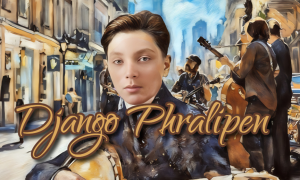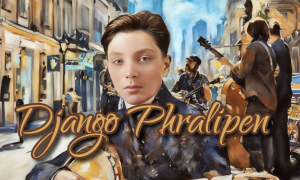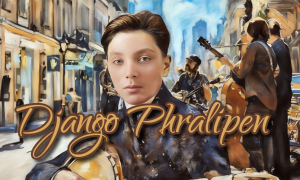Home » Jazz Articles » Django's Cosmic Echo » Chapter Seventeen: The Unspoken Duet
Chapter Seventeen: The Unspoken Duet
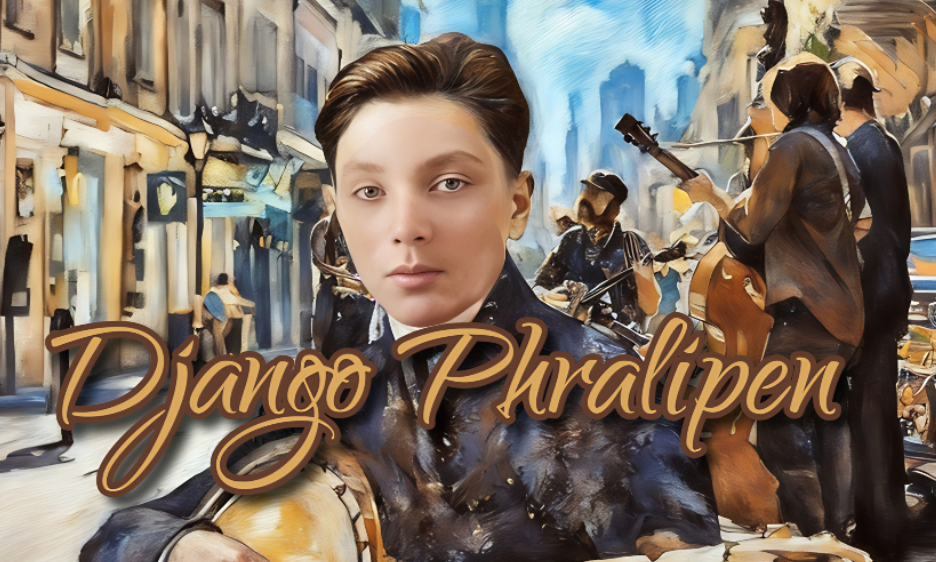
Courtesy AI
Chapters
1 | 2 | 3 | 4 | 5 | 6 | 7 | 8 | 9 | 10 | 11 | 12 | 13 | 14 | 15 | 16 | 17 | 18The air backstage at the Teatro Municipal thrummed with a contained electricity. Technicians scurried, musicians tuned, and the low murmur of the expectant Rio audience seeped through the heavy velvet curtains. Django Phralipen stood in the wings, his custom Gibson gleaming softly under the dim work lights. Outwardly, he was the picture of serene focus, but beneath the surface, his heart beat a rapid, syncopated rhythm against his ribs. This night felt different, heavier with consequence than any performance in recent memory.
A respectful hush fell as

Stephane Grappelli
violin1908 - 1997
Midway through Django's first set, after a particularly explosive rendition of one of his own compositions that left the audience roaring, he stepped to the microphone. The applause gradually subsided.
"Ladies and gentlemen of Rio," Django began, his voice smooth and resonant, "tonight, we are graced with the presence of a true, living legend. A man whose violin painted masterpieces of sound alongside one of the greatest musical innovators the world has ever known. His music has touched generations, and his spirit embodies the very soul of jazz. It is my profound honor to welcome to this stage... Monsieur StЁҰphane Grappelli!"
The Teatro Municipal erupted. As Grappelli, a figure of jazz history personified, walked onto the stage, the ovation was deafening, a wave of love and respect washing over him. He smiled, a genuine, warm smile this time, acknowledging the crowd, then turned to Django with a look that was a complex mixture of curiosity, trepidation, and an artist's undeniable pull towards the music. Django leaned into his microphone. "Maestro... 'Nuages'?"
Grappelli nodded, lifting his violin to his chin. A hush fell over the theatre, so profound one could hear the faint hum of the stage lights.
Django began, his fingers caressing the strings. The opening notes of "Nuages" emerged, instantly recognizable, yet imbued with a subtle difference. It was Reinhardt's spirit, undeniably—the melancholic lilt, the poignant phrasing, the intuitive harmonic sensibility—but delivered with an effortless, five-fingered fluidity that built a richer, more expansive sonic tapestry. There was no struggle, only grace.
Then Grappelli's violin entered, a pure, sweet tone that soared through the theatre, weaving its timeless melody. And as they played, something extraordinary began to happen. The years, the different paths, the impossible mystery of Django Phralipen's existence—it all seemed to dissolve in the transcendent language of the music. Their connection was immediate, profound, almost telepathic. Grappelli found himself improvising with a freedom he hadn't felt in years, his bow dancing across the strings, while Django anticipated his every nuance, his every flight of fancy, providing a harmonic foundation that was both deeply empathetic and thrillingly inventive.
Grappelli's eyes, when he chanced a look at the younger man, were wide with a mixture of emotions too potent to name. Astonishment, certainly. Deep, unsettling confusion, undoubtedly. But also, a dawning, almost fearful understanding. He was looking at Django Phralipen, the contemporary star, yet he was hearing—no, feeling—the very soul of his Django. The phrasing, the timing, the audacious musical leaps, the sheer Romani heart beating within the notes—it was all there, a vibrant phantom conjured by the strings. But this phantom had five fingers, producing cascades of notes, complex chord voicings, and a resonant power that his Django, for all his genius, had only been able to imply. The spirit was identical; the execution was... amplified.
The song swelled to its gentle conclusion, the final notes hanging in the air like a whispered secret. For a beat, there was absolute silence, a collective breath held by thousands. Then, the theatre exploded in a thunderous, sustained ovation that seemed to shake the very foundations of the building.
Later, in the quiet of Django's dressing room, the air was still thick with the echoes of the performance and unspoken emotions. The remnants of champagne and congratulations had faded, leaving only Django, Dirk, and a visibly shaken StЁҰphane Grappelli. Dirk, sensing the depth of the moment, quietly excused himself.
Grappelli paced the small room for a moment, his violin resting on a plush chair. He stopped, turning to Django Phralipen, his face a mask of turmoil.
"Young man..." he began, his voice raspy, struggling for words. "What I heard tonight... what I felt up there..." He shook his head, a gesture of profound bewilderment. "For decades, I have told the world, and I believed it with every fiber of my being, that Django Reinhardt was unique. A phenomenon. What he achieved with his... his limitations... it was a miracle of music. No one could ever truly replicate that fire, that particular genius."
He looked directly at Django Phralipen, his eyes searching, troubled, almost pleading for an explanation he knew couldn't be given. "But tonight... listening to you play... seeing your hands..." He swallowed hard. "You have his soul, Monsieur Phralipen. You have his fire. His very spirit seems to flow through you. And yet..." He gestured towards Django's hands, a look of almost pained awe on his face. "With all your fingers... the possibilities... the music you can summon... It is almost... a sacrilege to even think it," he whispered, the words costing him, "but it is... more. The music, it has a breadth, a completeness..." He trailed off, the implications of his own words clearly disturbing him, challenging a lifetime of deeply held convictions about his friend's singular, untouchable genius.
Django listened, his own emotions raw, his heart aching with a mixture of sorrow for the burden of his secret and a strange sense of release. He saw the profound conflict in Grappelli's eyes.
"Maestro," Django said softly, his voice filled with a deep and genuine respect, "your friendship, your musical partnership with Django Reinhardt... it is a legend that inspires musicians like me every single day. What he created, what you both created together, in its own time, with its own magic, can never be replicated or surpassed. It simply is."
He met Grappelli's gaze. "And you, Maestro StЁҰphane," he continued, his voice earnest, "you have been the keeper of that flame. For all these years, through all the changing fashions of music, you have carried his music, his spirit, to every corner of the world. Without you, how many would have forgotten? How many young musicians like myself would never have known the true depth of his gift? You are the living bridge between his time and ours. The world, and musicians everywhere, owe you an immeasurable debt for that."
Grappelli absorbed Django's words, his expression softening slightly. The younger man's humility, his profound respect, was undeniable. He looked down, then back up at Django, a flicker of the earlier confusion returning, mingled now with a deep weariness.
"It is... uncanny," Grappelli said softly, almost to himself. "The name... the spirit in your playing... " He shook his head slowly, still wrestling with the impossible. A long silence settled between them, filled only by the distant sounds of the city. Django longed, with an intensity that was almost unbearable, to unburden himself, to tell this man, this vital link to his past, the whole incredible truth. But he couldn't. The secret was too deep, the implications too vast, the potential for disbelief or even pain too great.
Finally, Grappelli straightened, a sigh escaping him. He extended his hand. "You are an extraordinary musician, Monsieur Phralipen," he said, his voice regaining some of its customary warmth, though his eyes still held the shadow of the unsolvable. "Truly extraordinary."
Django took the offered hand, his grip firm. "The honor was all mine, Maestro. More than you can ever know."
Grappelli nodded, gave a small, enigmatic smile, and then he was gone, leaving Django alone with the echoes of "Nuages" and the bittersweet weight of his hidden life. He walked to the window, looking out over the glittering expanse of Rio de Janeiro under the stars. A sense of peace, fragile yet profound, settled over him, mingled with the enduring ache of his secret. He couldn't share the truth of his identity, but tonight, through the music, he had connected with his past, with StЁҰphane, in the only way he truly could. The music they had made together, a fleeting duet between a ghost and a legend, hung in the warm Brazilian night. And for this one night, it had been enough.
Story by Alan Bryson, edited and assisted by AI.
Disclaimer: This is a fictional account exploring what might have happened if a temporal quantum event had occurred. While real musicians and historical figures appear within these pages, they exist here in an alternate timeline—a reality that quantum theory suggests was possible, but that never came to pass. All interactions, conversations, and events involving these individuals are entirely fictional, products of a world that exists only in the space between what was and what might have been.
Tags
Comments
PREVIOUS / NEXT
Support All About Jazz
 All About Jazz has been a pillar of jazz since 1995, championing it as an art form and, more importantly, supporting the musicians who make it. Our enduring commitment has made "AAJ" one of the most culturally important websites of its kind, read by hundreds of thousands of fans, musicians and industry figures every month.
All About Jazz has been a pillar of jazz since 1995, championing it as an art form and, more importantly, supporting the musicians who make it. Our enduring commitment has made "AAJ" one of the most culturally important websites of its kind, read by hundreds of thousands of fans, musicians and industry figures every month.




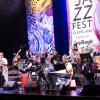

 Buy Now
Buy Now






